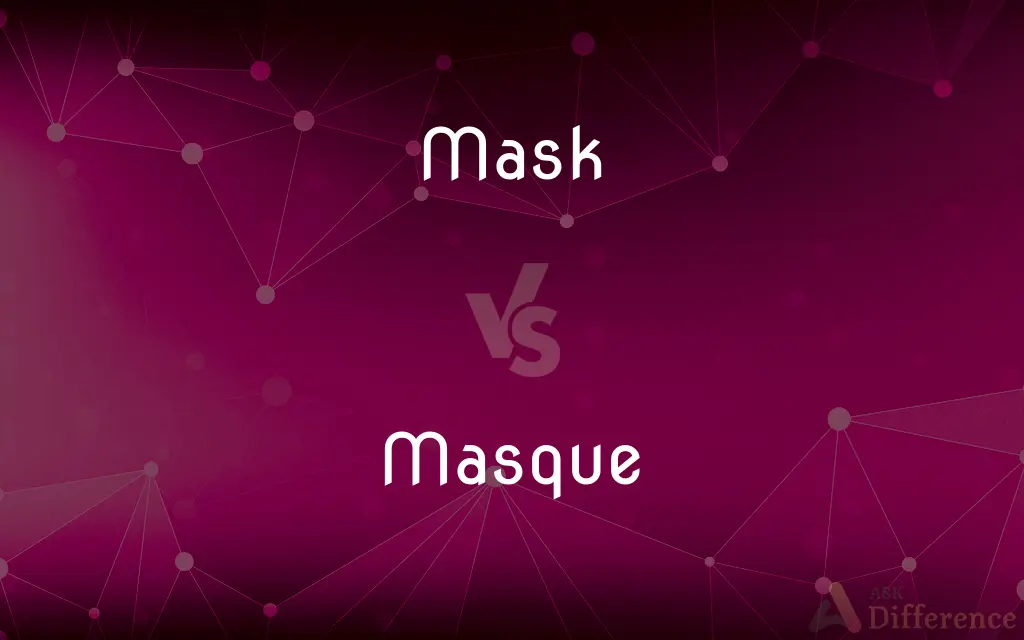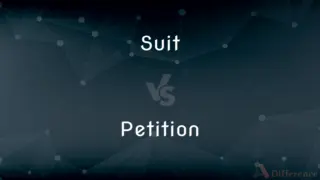Mask vs. Masque — What's the Difference?
By Tayyaba Rehman & Urooj Arif — Updated on March 21, 2024
A mask is a covering for the face, used for protection, disguise, or entertainment, while a masque is a form of dramatic entertainment, often involving poetry and dance, popular in the 16th and 17th centuries.

Difference Between Mask and Masque
Table of Contents
ADVERTISEMENT
Key Differences
A mask is primarily designed to cover the face for various purposes such as protection from pollutants or diseases, concealment, or as part of a costume. It serves a functional role in many activities and professions. On the other hand, a masque was a sophisticated form of entertainment in Europe, especially in England, during the 16th and 17th centuries, combining elements of drama, music, dance, and elaborate costumes, often performed at royal courts or aristocratic events.
Masks can be made from a wide range of materials, including fabric, paper, plastic, and silicone, depending on their intended use, whether for healthcare, industrial safety, or personal expression. Masques, however, were characterized by their lavish production values, including expensive and ornate costumes and scenery, reflecting the wealth and status of their patrons.
While masks are used worldwide in various cultures for ceremonies, festivals, and theatrical performances, symbolizing different aspects of the human experience and beliefs, masques were a form of entertainment rooted in European traditions, reflecting the social and political ideals of the time through allegorical narratives.
In modern times, masks have gained prominence for their health-related benefits, particularly in preventing the spread of infectious diseases. In contrast, masques are primarily of historical interest, studied for their cultural and literary significance, rather than being a living form of entertainment.
Masks are a part of everyday life in many contexts, from the arts to healthcare, and serve both practical and symbolic purposes. Masques, while no longer performed, continue to influence contemporary theater and performance art, leaving a legacy of the fusion of various artistic disciplines.
ADVERTISEMENT
Comparison Chart
Definition
A covering for the face
A form of dramatic entertainment
Primary Use
Protection, disguise, or entertainment
Entertainment involving poetry, music, and dance
Material
Fabric, paper, plastic, silicone
Elaborate costumes and scenery
Cultural Significance
Worldwide, varying by culture
European, especially 16th and 17th centuries
Modern Relevance
Highly relevant for health, safety, and expression
Historically significant, with limited contemporary relevance
Compare with Definitions
Mask
A protective covering for the face.
She wore a mask to the grocery store for safety.
Masque
A form of aristocratic entertainment in the Renaissance.
The court attended a lavish masque celebrating the king's victory.
Mask
Symbolic or ritualistic wear in ceremonies.
The dancer donned a traditional mask during the festival.
Masque
A historical influence on opera and ballet.
Many elements of the masque can be seen in modern opera.
Mask
A facial treatment in beauty care.
She applied a clay mask for skin rejuvenation.
Masque
A blend of music, dance, and poetry in performance.
The masque featured renowned poets and musicians of the era.
Mask
An interface element in software to restrict data input.
The form used a mask to ensure phone numbers were entered correctly.
Masque
A theatrical production with elaborate costumes.
The masque's costumes were designed by the finest tailors.
Mask
An accessory for disguise or performance.
His costume included a detailed mask of a lion.
Masque
An event showcasing allegorical storytelling.
The masque represented the moral virtues through its characters.
Mask
A covering made of fibre or gauze and fitting over the nose and mouth to protect against air pollutants, or made of sterile gauze and worn to prevent infection of the wearer or (in surgery) of the patient.
Masque
The masque was a form of festive courtly entertainment that flourished in 16th- and early 17th-century Europe, though it was developed earlier in Italy, in forms including the intermedio (a public version of the masque was the pageant). A masque involved music and dancing, singing and acting, within an elaborate stage design, in which the architectural framing and costumes might be designed by a renowned architect, to present a deferential allegory flattering to the patron.
Mask
A mask is an object normally worn on the face, typically for protection, disguise, performance, or entertainment. Masks have been used since antiquity for both ceremonial and practical purposes, as well as in the performing arts and for entertainment.
Masque
A dramatic entertainment, usually performed by masked players representing mythological or allegorical figures, that was popular in England in the 1500s and early 1600s.
Mask
A covering for all or part of the face, worn as a disguise, or to amuse or frighten others.
Masque
A dramatic verse composition written for such an entertainment.
Mask
A face pack
This exfoliating mask helps clear your pores and leaves your skin feeling soft and healthy
Masque
See masquerade.
Mask
A likeness of a person's face moulded or sculpted in clay or wax.
Masque
A dramatic performance, often performed at court as a royal entertainment, consisting of dancing, dialogue, pantomime and song.
Mask
A manner or expression that hides one's true character or feelings
I let my mask of respectability slip
Masque
Words and music written for a masque.
Mask
A piece of material such as card used to cover a part of an image that is not required when exposing a print.
Masque
A masquerade.
Mask
A patterned metal film used in the manufacture of microcircuits to allow selective modification of the underlying material.
Masque
Archaic form of mask
Mask
The enlarged labium of a dragonfly larva, which can be extended to seize prey.
Masque
A facial mask.
Mud masque; clay masque
Mask
Cover (the face) with a mask
He had been masked, bound, and abducted
Masque
Archaic form of mask
Mask
Conceal (something) from view
The poplars masked a factory
Masque
A mask; a masquerade.
Mask
Cover (an object or surface) so as to protect it during painting
Mask off doors and cupboards with sheets of plastic
Masque
A party of guests wearing costumes and masks
Mask
A covering, as of cloth, that has openings for the eyes, entirely or partly conceals the face, and is worn especially at a masquerade ball.
Mask
A grotesque or comical representation of a face, worn especially to frighten or amuse, as at Halloween.
Mask
A facial covering worn for ritual.
Mask
A figure of a head worn by actors in Greek and Roman drama to identify a character or trait and to amplify the voice.
Mask
A protective covering for the face or head.
Mask
A gas mask.
Mask
A usually rubber frame forming a watertight seal around the eyes and nose and containing a transparent covering for use in seeing underwater.
Mask
A covering for the nose and mouth that is used for inhaling oxygen or an anesthetic.
Mask
A covering worn over the nose and mouth, as by a surgeon or dentist, to prevent infection.
Mask
A mold of a person's face, often made after death.
Mask
An often grotesque representation of a head and face, used for ornamentation.
Mask
An area of contrasting color on the face and usually across the eyes of an animal.
Mask
The head, face, or muzzle of certain animals, such as a fox or a dog.
Mask
A face having a blank, fixed, or enigmatic expression.
Mask
Something, often a trait, that disguises or conceals
"If ever I saw misery under a mask, it was on her face" (Erskine Childers).
Mask
A natural or artificial feature of terrain that conceals and protects military forces or installations.
Mask
An opaque border or pattern placed between a source of light and a photosensitive surface to prevent exposure of specified portions of the surface.
Mask
The translucent border framing a television picture tube and screen.
Mask
(Computers) A pattern of characters, bits, or bytes used to control the elimination or retention of another pattern of characters, bits, or bytes.
Mask
A cosmetic preparation that is applied to the face and allowed to dry before being removed, used especially for cleansing and tightening the skin.
Mask
Variant of masque.
Mask
A person wearing a mask.
Mask
To cover (the face, for example) with a decorative or protective mask.
Mask
To cover in order to conceal, protect, or disguise
Masked the baseboard with tape before painting the wall.
Mask
To make indistinct or difficult to perceive
Spices that mask the strong flavor of the meat.
Sounds that were masked by white noise.
Mask
To conceal by dissembling
A smile that masked his anger.
Mask
(Chemistry) To prevent (an atom or a group of atoms) from taking part in a normal reaction.
Mask
To put on a mask, especially for a masquerade ball.
Mask
To conceal one's real personality, emotion, or intention.
Mask
A cover, or partial cover, for the face, used for disguise or protection.
A dancer's mask; a fencer's mask; a ball player's mask
Mask
That which disguises; a pretext or subterfuge.
Mask
A festive entertainment of dancing or other diversions, where all wear masks; a masquerade.
Mask
A person wearing a mask.
Mask
(obsolete) A dramatic performance in which the actors wore masks and represented mythical or allegorical characters.
Mask
(architecture) A grotesque head or face, used to adorn keystones and other prominent parts, to spout water in fountains, and the like.
Mask
(fortification) In a permanent fortification, a redoubt which protects the caponiere.
Mask
(fortification) A screen for a battery.
Mask
(zoology) The lower lip of the larva of a dragonfly, modified so as to form a prehensile organ.
Mask
A flat covering used to block off an unwanted portion of a scene or image.
Mask
A pattern of bits used in bitwise operations; bitmask.
Mask
(computer graphics) A two-color (black and white) bitmap generated from an image, used to create transparency in the image.
Mask
(heraldry) The head of a fox, shown face-on and cut off immediately behind the ears.
Mask
(psychology) A social phenomenon where autistic people learn, practice, and perform certain behaviors and suppress others in order to appear more neurotypical.
Mask
Mesh
Mask
The mesh of a net; a net; net-bag.
Mask
Mash.
Mask
(transitive) To cover (the face or something else), in order to conceal the identity or protect against injury; to cover with a mask or visor.
Mask
(transitive) To disguise as something else.
Mask
(transitive) To conceal from view or knowledge; to cover; to hide.
Mask
To conceal; also, to intervene in the line of.
Mask
To cover or keep in check.
To mask a body of troops or a fortess by a superior force, while some hostile evolution is being carried out
Mask
(intransitive) To take part as a masker in a masquerade.
Mask
(intransitive) To wear a mask.
Mask
To disguise oneself, to be disguised in any way.
Mask
(intransitive) To conceal or disguise one's autism.
Mask
(transitive) to cover or shield a part of a design or picture in order to prevent reproduction or to safeguard the surface from the colors used when working with an air brush or painting
Mask
To set or unset (certain bits, or binary digits, within a value) by means of a bitmask.
Mask
To disable (an interrupt, etc.) by setting or unsetting the associated bit.
Mask
To mash.
Mask
(brewing) To mix malt with hot water to yield wort.
Mask
To be infused or steeped.
Mask
To prepare tea in a teapot; alternative to brew.
Mask
To bewilder; confuse.
Mask
A cover, or partial cover, for the face, used for disguise or protection; as, a dancer's mask; a fencer's mask; a ball player's mask.
Mask
That which disguises; a pretext or subterfuge.
Mask
A festive entertainment of dancing or other diversions, where all wear masks; a masquerade; hence, a revel; a frolic; a delusive show.
This thought might lead me through the world's vain mask.
Mask
A dramatic performance, formerly in vogue, in which the actors wore masks and represented mythical or allegorical characters.
Mask
A grotesque head or face, used to adorn keystones and other prominent parts, to spout water in fountains, and the like; - called also mascaron.
Mask
In a permanent fortification, a redoubt which protects the caponiere.
Mask
The lower lip of the larva of a dragon fly, modified so as to form a prehensile organ.
Mask
A person wearing a mask; a masker.
The mask that has the arm of the Indian queen.
Mask
The head or face of a fox.
Mask
To cover, as the face, by way of concealment or defense against injury; to conceal with a mask or visor.
They must all be masked and vizarded.
Mask
To disguise; to cover; to hide.
Masking the business from the common eye.
Mask
To conceal; also, to intervene in the line of.
Mask
To take part as a masker in a masquerade.
Mask
To wear a mask; to be disguised in any way.
Mask
A covering to disguise or conceal the face
Mask
Activity that tries to conceal something;
No mask could conceal his ignorance
They moved in under a mask of friendship
Mask
A party of guests wearing costumes and masks
Mask
A protective covering worn over the face
Mask
Hide under a false appearance;
He masked his disappointment
Mask
Put a mask on or cover with a mask;
Mask the children for Halloween
Mask
Cover with a sauce;
Mask the meat
Mask
Shield from light
Common Curiosities
How do masks play a role in cultural ceremonies?
They symbolize various aspects of human experience and beliefs.
Are masques still performed today?
They are rare and primarily of historical interest.
What materials are masks made of?
They can be made from fabric, paper, plastic, and silicone.
What is the primary function of a mask?
To cover the face for protection, disguise, or entertainment.
How do modern performances incorporate elements of the masque?
Through the fusion of music, dance, and elaborate staging.
How does the material of a mask determine its use?
The material affects its durability, protection level, and suitability for different activities.
Can masks be used for health reasons?
Yes, they are commonly used to prevent the spread of diseases.
Do masks have a symbolic meaning in performances?
Yes, they can represent different characters, emotions, or themes.
What makes a masque unique in historical entertainment?
Its combination of poetry, music, dance, and elaborate staging.
Was the masque exclusive to any particular class?
It was predominantly an entertainment form for the European aristocracy.
What was the social significance of masques in their time?
They showcased the wealth, power, and artistic tastes of their patrons.
Are masques considered a precursor to any modern entertainment forms?
Yes, they influenced the development of opera and ballet.
Did masques convey any particular messages?
They often contained allegorical themes reflecting social and political ideals.
What is a key difference in the use of masks and masques today?
Masks are widely used for various practical purposes, while masques are studied for their cultural significance.
Can masks be part of daily attire?
In some cultures and contexts, especially for health reasons.
Share Your Discovery

Previous Comparison
Suit vs. Petition
Next Comparison
Judge vs. SolicitorAuthor Spotlight
Written by
Tayyaba RehmanTayyaba Rehman is a distinguished writer, currently serving as a primary contributor to askdifference.com. As a researcher in semantics and etymology, Tayyaba's passion for the complexity of languages and their distinctions has found a perfect home on the platform. Tayyaba delves into the intricacies of language, distinguishing between commonly confused words and phrases, thereby providing clarity for readers worldwide.
Co-written by
Urooj ArifUrooj is a skilled content writer at Ask Difference, known for her exceptional ability to simplify complex topics into engaging and informative content. With a passion for research and a flair for clear, concise writing, she consistently delivers articles that resonate with our diverse audience.














































